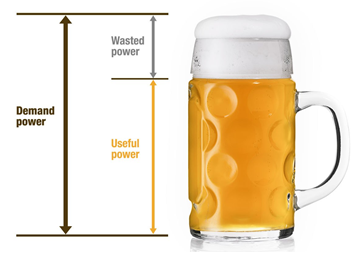Whether you like head on your beer or not, if you use the analogy in electricity the “head” is wasted money. Unlike in a pub (if we ever get back in one !), head in a factory is often not visible. You are drinking beer and regardless of how much head there is, the company still is picking up the tab. If you are looking for the next 5%-10% savings then you should find out how much “head” you have

In a factory there are three main sources of “head”:
- Transformer Losses
- Over-Voltage
- Poor Power Factor
If your factory is supplied at 11kV, the it is metered for the kWh supplied at 11kV. But the power has to be transformed down to 400-415v for use. This incurs losses of between 2%-9% of your TOTAL energy consumption. How much you lose depends on the efficiency of your transformer, and yet very few business know how efficient it is or even monitor it.
Over Voltage – Most motors are designed to operate at 400v. If they are supplied with a higher voltage they either work harder or emit the excess power as heat. Both of these shorten the life of the motors, as well as incur electricity costs. Voltage Optimisation can address this by reducing the supply voltage to your electrical equipment which reduces your power consumption and energy usage.
Poor Power Factor – Without getting too technical, machinery loads can also distort power in your factory. The froth in the beer analogy is reactive power. A good Power Factor is 95%-100%, but we regularly see factories operating at 80% or less. This costs money, and can often be fixed using a Power Factor Correction (PFC) device.
All three of these losses can exist. The solutions operate in different ways and are complementary technologies. Just because you have solved one, doesn’t mean the others wouldn’t work.






